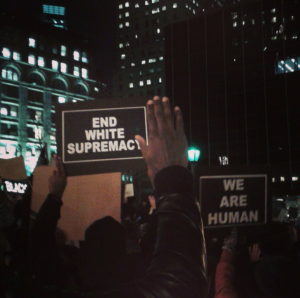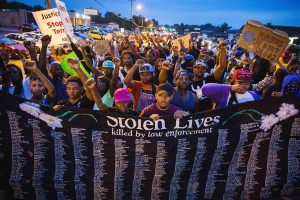Hidden Histories: On Ferguson, and our History of “Equality”
Before you read my reaction, I feel the need to situate myself within this discussion. I write as a White woman born of a working-lower middle class family who grew up in a small town in the exact center of CT. I am now a graduate student in Environmental Psychology program at the CUNY Graduate Center and teach Urban Studies at Queens College. Though I have a ‘knowing’ of the hidden history I allude to below, my life has been largely untouched by it. I find my voice at the intersection of this contradiction. Please accept the following thoughts as one among a myriad of valuable perspectives on the decision and actions of last night, as well as the actions to come.
NOV 25, 2014: I am infuriated by the Ferguson decision last night. I am infuriated by the media’s decision to focus solely on the violence that erupted. And I am infuriated by the lack of introspection and empathy many of us have shown for the loss of life, the loss of someone’s son, the loss of a child – and the lack of systemic acknowledgement and empathy for that loss as expressed through the denial of justice embedded in the decision last night. Many of us sharing this anger, blame ignorance and racism, and sure, this is part of it, but it is not the whole story. I think throwing these terms around are oversimplified summations of what is a much deeper issue – and more so, I think they are unproductive in terms of moving forward. And, while I believe it is time to mourn, and I believe that over the next few days or weeks that is what we must do, ultimately we need to be able to move forward and progress. In an effort to do that, we must explore the underbelly of these acts of racism and these acts of ignorance so we can move past the stonewalling created by throwing slurs at each other – which ultimately only creates further divisions and blockades. We need to be able come together as people who share this land, and we need to understand the roadblocks to accomplishing this.
With this in mind, I find it more useful to direct my infuriation toward the way history has obfuscated the significance of all that has happened in Ferguson (and beyond) – as well as with Trayvon Martin, Akai Gurley, Eric Garner, and Tamir Rice to name other recent victims – rendering the frustration and expression of frustrations of the broadly affected communities unintelligible to those who may feel they are unaffected.
I read an article a couple of years ago – of which the authors and title escape me now, I will remember later today or tomorrow but this is not the heart of the matter – that discussed the lack of control we have over the ultimate effects of policies regardless of their initial purposes and the good they might do. In one of the many #Ferguson articles (or social media blurbs) that my eyes have glossed over today, an akin between the political action being taken today (both specifically, and as current historical era marker) and the Civil Rights Movement of the 60’s was made. I can understand the parallel, but I am more interested in thinking about how the Civil Rights movement has manifested in our world today. As of right now, I am thinking about it in relation to the ignorance, racism, and really, intolerance that I discuss as “infuriating” above.
In 1965 the Civil Rights Bill was passed. For many, this marked the end of discrimination and prejudice. Equality was achieved through legislation, and legally enshrined. This is what I myself, and many others in this country have been taught in school. And for many – and let’s be honest, I’m talking mainly about White people who are most prone to living in bubbles, whether they live in the suburbs, rural areas, or in cities and can’t fathom the life experiences of what it means to not be White – these myths are still perceived as truths.

There is no denying that the Civil Rights Movement was a step in the right direction; at the very least it was an unprecedented legal acknowledgment – and mandate – that Black people should have the same rights as White people. However, right now, I am wondering if, over the course of time, the unintended consequences have counteracted some of the positive steps forward because it lead many to believe that racism was over. In a sense, the bill’s passing has created an impenetrable perception of equality in the minds of ‘White America’; a perception that has been sealed with the two-term election a Black President whose name is ‘Barack Hussein Obama’. It has illegitimated the ‘excuses’ Black communities can provide for the injustices waged against them. This unwavering perception of equality has allowed for a covert erosion of the rights put forth in that bill and the continued subjugation of Black communities and their continued occupation of the bottom rungs of the social hierarchy in this country. The injustices and demonization waged against this community of people was easy to see when they were written into law, but have become more difficult to identify today when they occur through backdoors, beneath the sanctity of colorblind policy, and particularly when that history is not taught or experienced.
In illustrating this history, we can consider the pointed intentions of urban disinvestment, the distribution of exotic mortgages, the revitalization, gentrification, and community displacement of urban spaces, the hyper-incarceration encouraged by the War on Drugs and broken windows policing tactics by which young Black men are funneled into the criminal justice system (the record of which compromises additional rights to employment, housing, political participation, etc), and the simultaneous trapping of young Black mothers in a welfare system that funnels them into the lower ranks of the job market – to name a few. While the latter policy shift began in the 90s, the others took root in the 70’s, shortly after ‘equality’ was ‘secured’.
Many of us have been blind to this. Throughout our lives and through many avenues including the news, cultural media, and our education system, we are taught fairy tales of equality and justice that underpin the “American Dream”. We are taught that through hard work and perseverance we, meaning everyone, can overcome any obstacles. Our forever optimism, and the notion of the level playing field that was ushered in by the Civil Rights Bill has veiled a history of uninterrupted injustice. Without knowledge of this history, one might perceive the burning down and looting of stores as an overreaction to one death. But for those of us who know and understand this history, and even more so, for those of us who have lived that history, this is not about one death. This is about years, hundreds of years, of injustice. In understanding this history, the expression of frustration last night is rendered perfectly logical.
Simultaneously, the condemnation of certain comments filling various social media outlets regarding the expression of frustration in Ferguson last night as ‘racist’ or ‘ignorant’, though perhaps accurate, seems unproductive. More useful is to consider them as a part of a larger apparatus that has worked to conceal and suppress an important history. Though they may be the one’s benefitting, the dividing wall that disseminates an understanding of equality was not built by those who embody the understanding of equality and express it through ignorant and racist comments. This needs to be acknowledged as well.
Maybe not in the next few days, or weeks, but eventually, we need to try to put this racism and ignorance in the context of a history that has been systemically suppressed and only communicated to those who do and will experience it, and to point the dagger in a common direction that will lead us to greater human understanding and co-commiserating, and ultimately toward a healing – both emotionally, communally, and policy-wise.
Regardless of his other comments or the lack of weight of his words, Obama was right when we said ‘this is not just about Black communities in America, but that this is about all of us’. At the heart of it, this is about addressing the human injustices that are, and have been, rupturing the communities of our nation.
—
If this resonates with you – I ask that you please join in the collective mourning, the collective expression of anger, and the collective desire for a way moving forward that is taking place at 7p in Union Square in NYC this evening and at many other locations over the next few days.
Posted on: August 1, 2015